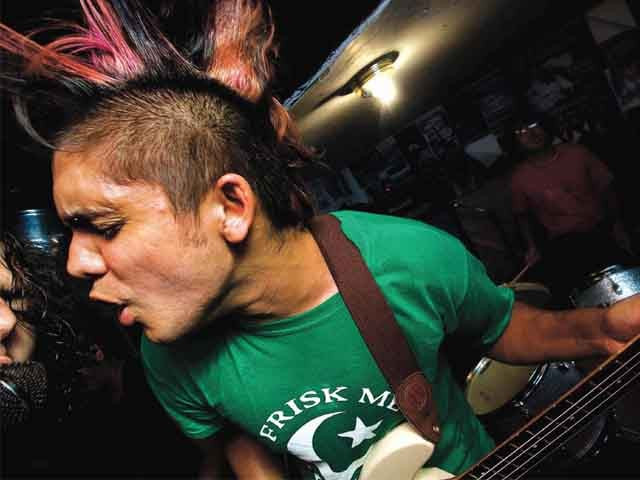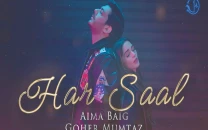Punking Pakistan up
The Taqwacore movement is a rejection of traditional Islam, incorporated by different bands such as The Kominas.

Let’s take their song “Kuj”: It’s a marriage that, on paper, seems to be a rishta aunty’s worst nightmare. The words are of the late Munir Niazi, one of the finest Punjabi poets of recent times. The beat is punk rock; guitars, a pounding drum beat, a vocalist crooning in Punjabi and a catchy beat. The result is the 21st century interpretation of the poem “Kuj” by The Kominas.
The last Americans of Pakistani origin who created waves were the would-be Times Square bomber Faisal Shahzad and the Sargodha 5. The Kominas may have songs like “Suicide Bomb the Gap”, and lyrics like “Wal-Qaeda Superstore/Those other joints are such a bore”, but let that not raise your hair on end. Imran Malik, drummer and back up vocalist for The Kominas doesn’t look like a terrorist-in-training, even though he does have long hair and facial growth.
The Kominas’ claim to fame was their role as a Taqwacore band, and their debut album, Wild Nights in Guantanamo Bay, which propelled them into fame. The Taqwacore movement, introduced by Michael Mohammad Knight, was a rejection of traditional Islam, which was incorporated by different bands such as The Kominas in their sound. Malik, while talking about the album, says, “That album was released when no one knew who The Kominas were, and it was more like, lets make an enormous statement for our friends. We thought “Suicide Bomb the Gap” was funny; these were things that you’d never heard in music before and that was the idea. The driving force behind the album was to see what a Taqwacore punk band would sound like and make it a reality.”
However, Malik says that there is much more to The Kominas than the label “Muslim punk band”. “We don’t identify with Islam as much as we identify with our Pakistani heritage. Songs like “Pardesi”; you take a typical iktara [a traditional one-string instrument] riff and mix it with reggae and ska. That kind of stuff is exciting to us. The idea is not to fuse these kinds of music, but to take South Asian music and translate it into something where you use it with the instruments we know how to play because we grew up in America, we identify with rock culture and the instruments. And the idea of three to five brown kids making music…you can use your own vocabulary, so that’s what we’re doing, talking about things that we talk about between ourselves. That was the idea and it continues to be the idea of the things that we do. Our influences are all over the place, living in Brooklyn there are all kinds of bands that people haven’t heard of, and we play with all kinds of people. Some people would think that that’s not going to work, that you need to have a distinct sound. But we’re so complex and there’s no reason to hide behind some kind of idea. Calling it Taqwacore- it’s a label that would restrict us. We definitely have some songs that can be called Muslim punk songs like “Shariah Law in the USA” and “Suicide Bomb the Gap”. “Kuj”, however, is not a Muslim punk song, it’s about living and growing up in Lahore, and how it’s a cool place. So it’s a really universal song, Munir Niazi wrote those lyrics and we identify with that, we’re not trying to restrict ourselves in any way. We want to make music that we find to be cool or interesting or surprising, there’s no theme or genre that we’ve stuck to.”
With lyrics such as “Hum sirf wohi piyeinge jo iraq mein pee rahe/Hum sirf wohi piyeinge jo karbala mein peeetay thay” in a song titled “Tunnn”, it is no surprise that The Kominas have a reputation for being controversial. In their second offering, an EP titled Escape to Blackout Beach, The Kominas covered a Naseebo Lal number, “Manji De Vich Daang”. Malik says that the Naseebo Lal track was his idea. “I was interested in the controversy behind her, and how banning someone like Naseebo Lal is an wefil thing. The only way as a band to pay tribute to someone like her is to cover one of her songs, and it was a song that we also find really funny, “a snake in a bed”- that’s hilarious.”
Basim Usmani, The Kominas’ lead vocalist says that their reputation as a controversial Muslim band overshadows the music that they write. “It doesn’t have to be that way. As we move on we’ll be using less vocals, and less lyrics. We’re trying to emphasise the beat in the material we’re writing currently. We’re thinking of expressing our ideas through rhythm. I don’t have to sing a verse in Punjabi if we use a Punjabi beat.”
Usmani says this is a gradual process. “Our first album had a few Punjabi songs on it, our last was half in Punjabi, for the BBC radio sessions we did mostly qawali, filmi and mujra music. So I think we’ve been emphasising our roots more and more, but now I think we’re going to emphasise the rhythms. It’s going to be an entirely new approach. We’ve put down money on an apartment in Philadelphia, we’ve been writing new material here for our third album.”
If there is one video that has beeen repeatedly YouTubed this year, it is The Kominas doing a cover of the Bollywood classic “Choli Ke Peeche” for Bobby Friction’s show on the BBC, part of their performance at the BBC Maida Vale studios. A young man croons the song that probably cemented Madhuri’s reputation as one of the finest dancers Indian cinema has ever produced.
Malik says, “We’ve been covering “Choli Ke Peeche” for years, it translates to a rock song so well, and it’s perfect. It’s one of our most popular songs, even with white audiences. And when Bobby Friction asked us to do the Maida Vale session he insisted that we play it. We weren’t even going to do it originally, but he insisted that this song is what’s going to make you guys blow up in a way. It’s something unique and universal. Not just Pakistanis and Indians but its a song that everyone knows and we all grew up listening to it. Bollywood is so strong in our culture,” laughs Malik.
“Who are these boys?”, one wonders. Pakistani boys in the US, punk music and a fascination for “Choli Ke Peeche”? Unilke other bands of South Asian origin, they’re certainly not jumping on the South Asian bandwagon.
In an op-ed for The Guardian, Basim expressed these views about the Sufi music festival held in New York: “As someone familiar with the regimen that mystics have to maintain, I feel that this politicisation cheapens our most cherished tradition. It’s akin to defecating in the sink where you wash your hands. The fact that the head of the Sufi council was a Musharraf crony Chaudhry Shujaat Hussain is embarrassing.” I ask Basim if he feels we’re exporting the wrong kind of music (like Salman Ahmad) to portray a moderate version of Pakistan? Basim says, “Yes, and when it becomes too political it alienates people from the music. Abida Parveen performed 10 years ago in Central Park and I think it was better then, than when she performed at this festival that was just beating people over the head with a stick. I think we need to protect these singers and their business in Pakistan.”
With an India tour in the works and a plan to come to Pakistan to perform in the winter, The Kominas want their music to become popular amongst all classes in the country. An example that both Usmani and Malik quote is their concert held a few years ago in the red light area of Lahore, where they invited everyone from the street to attend, and was featured in The Taqwacores film.
Malik says, “We’d like to see our music being played in taxis in Karachi as well as in somebody’s Mercedes.”
Published in The Express Tribune, November 21st, 2010.



















COMMENTS
Comments are moderated and generally will be posted if they are on-topic and not abusive.
For more information, please see our Comments FAQ